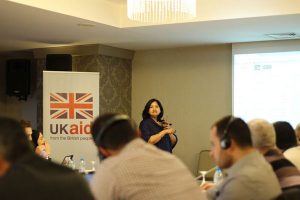Alumni stories
Dr. NILUKA WIJEKOON KANNANGARAGE is an epidemiologist, Health Information Management, WHO Emergency Program. She attended the Master of Public Health (MPH 2013-2014) at EHESP School of Public Health.
How did you hear about the EHESP school and what made you apply?
I am a medical doctor, an emergency physician by training. I have clinical experience in working in both public and private health sector in Sri Lanka. Following my clinical practice, I became the emergency health coordinator for International organization for Migration (IOM) emergency response during Sri Lankan ethnic conflict. I joined the World Health Organization (WHO) Sri Lanka, Emergency Health Action (EHA) unit in late 2010, and worked nearly 2 years before I heard about Erasmus Mundus* and EHESP.
A friend who worked at UN population Fund (UNFPA) introduced me to EHESP. I checked the website and was immediately impressed. I wanted to pursue studies in epidemiology and I thought EHESP should be the place to join. I applied for Erasmus Mundus program and received scholarship to follow Europubhealth program; Sheffield and EHESP pathway. Having worked in medical and public health sectors, I immediately understood the usefulness of array of modules EHESP had to offer. I shouldn’t fail to mention the influence of delightful prospect of studying in Paris as well.
What are the strengths of the courses you attended at the EHESP? Which impact did they have on your career?
There were number of modules to choose from depending on your likes, dislikes and wants. The academia came from different universities therefor it was a truly global experience. At EHESP, I chose the specialized stream of Epidemiology and Biostatistics. The class rooms were small and teachers paid individual attention to each and every student. It allowed students to pose questions, share experiences and most importantly feel connected. The theoretical knowledge given by EHESP greatly helped me prepare for an international public health career. The internship provided the extra edge to connect with the right people and organizations. I did my internship at WHO HQ Geneva related to communicable diseases and emergencies. EHESP has a great reputation in Europe as a pioneering institute in public health, so it was not difficult to establish a career as an alumni.
Could you describe your current position and tell us what you enjoy about your job?
I respond to global emergencies; natural disasters, conflicts and outbreaks, where my focus is establishing early warning, alert and response systems (EWAR). EWAR is part of the public health surveillance with primary aim of detecting disease outbreaks rapidly and responding to them timely. As part of my work, I travel to countries (Ethiopia, Nigeria, Guinea, Syria …) in emergencies to support WHO staff, Ministry of health staff, health partners, mainly in training. In other times, I support normative activities related to early warning systems, such as developing guidance, training packages, monitoring and evaluations. I work closely with large number of technical and academic institutions, UN, INGO and NGO partners whose main aim is to support emergency responses. I love what I do. Most days I train people, but sometimes I receive very valuable trainings as well. My view about the world and health has greatly expanded since working for WHO Headquarters. However small my contribution is, I strongly believe what I do as a job help people stay alive and healthy during emergencies.
Which advice would you give to those considering a career in public health?
Public health is a very diverse discipline where you can find vast number of different avenues, depending on your career aspirations. Fortunately, the skills needed to excel in public health are well covered in EHESP program with special emphasis on practical applicability. My key advice is to read widely. Knowledge truly supports you at the job front. At this stage in your student life, put effort to translate theatrical knowledge to practice whenever possible, interact with individuals, organizations, institutions which reflect your career goals, however unrefined they are. Develop soft skills that can add value to your expertise like communication, written or oral, networking and presentation skills. Above all make sure your decisions in public health are always ethical and equitable.
*Erasmus Mundus was an education, cooperation and mobility program of the European Union that came to an end on 31st December 2013. Europubhealth Program, formerly and Erasmus Mundus Master Course, is now supported by Erasmus + since 2014.



